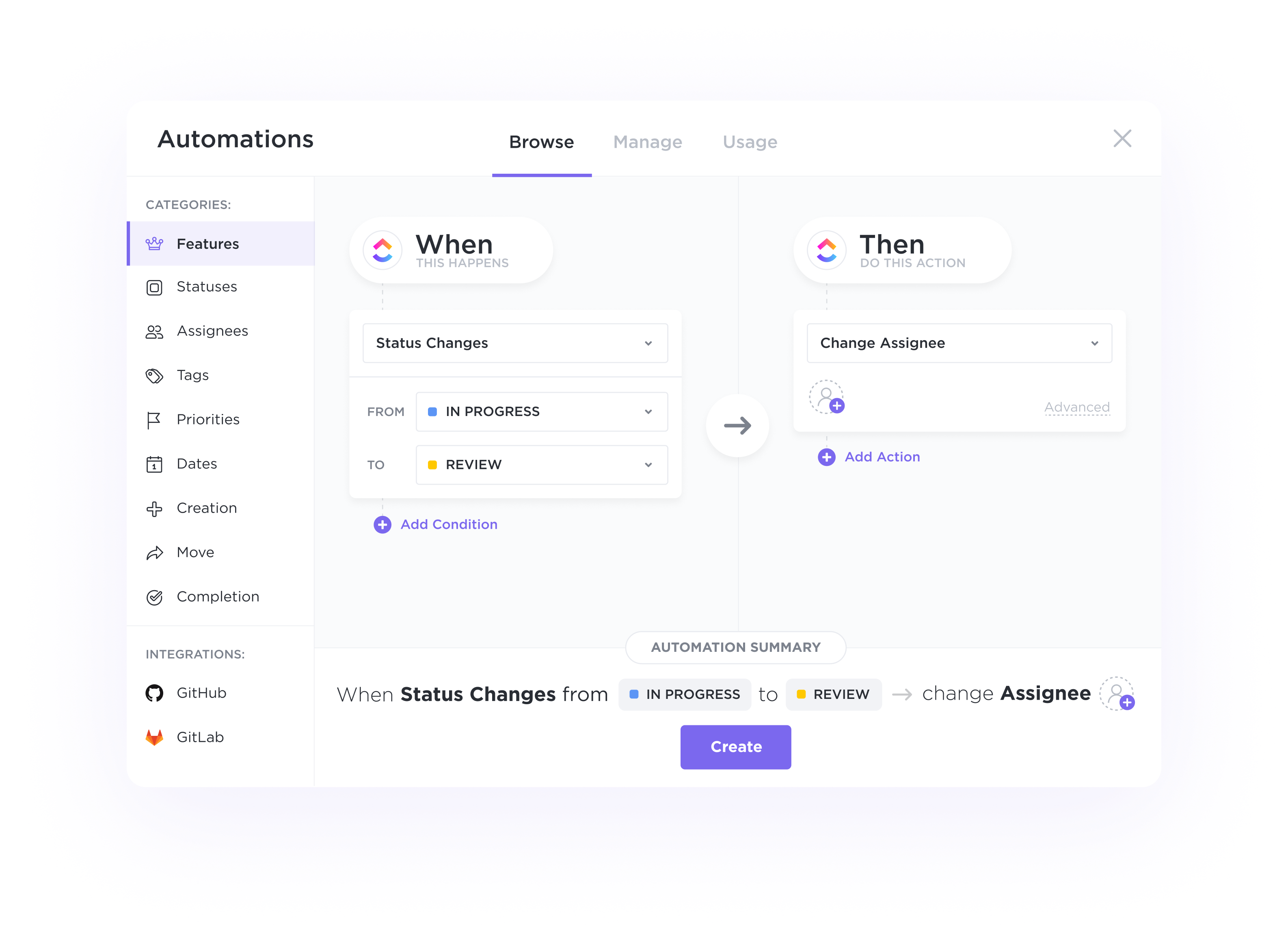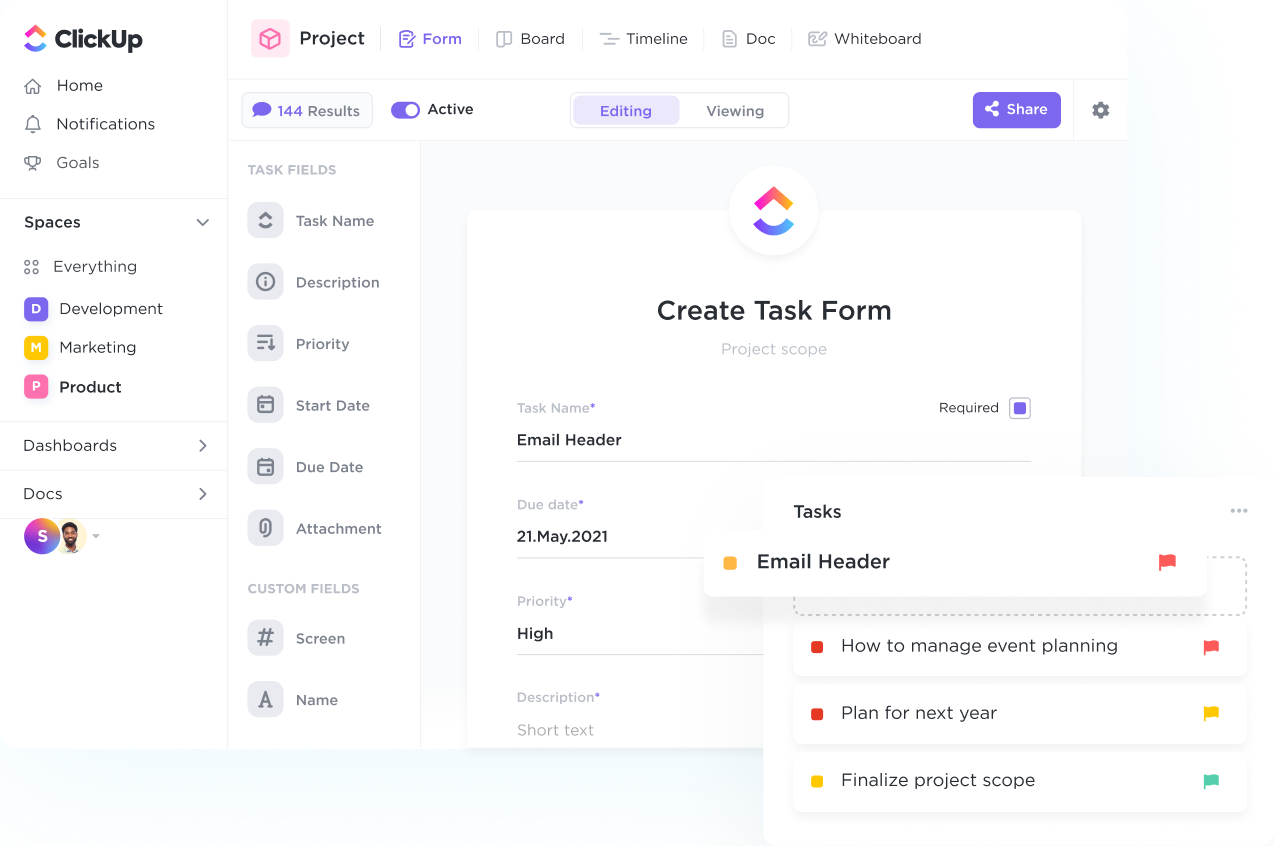Automations
Automate handoffs, status updates, and more.
Automatically assign tasks for each stage of your pipeline, trigger status updates based on activity, and switch priorities to alert your team on where to focus next.

Gantt Charts
Transform your customer relationships with ClickUp's customizable CRM software specifically designed for Brand Managers. Streamline your sales process, track customer interactions, and improve communication all in one place. Elevate your brand management game with ClickUp's intuitive platform.
Free forever. No credit card.
Automations
Automatically assign tasks for each stage of your pipeline, trigger status updates based on activity, and switch priorities to alert your team on where to focus next.

Forms
Streamline your intake process, organize response data, and automatically create tasks with custom branded Forms powered by conditional logic.

Brand managers can use CRMs to efficiently capture leads from various marketing campaigns and channels. By scoring leads based on predefined criteria, brand managers can prioritize follow-ups and nurture prospects through the sales funnel. This helps in focusing efforts on leads with higher conversion potential, ultimately improving the ROI of marketing campaigns.
Utilizing a CRM, brand managers can track and analyze customer behavior patterns to gain valuable insights into preferences and trends. By understanding how customers interact with the brand, managers can tailor marketing strategies to target specific customer segments effectively. Real-time data visualization tools within the CRM can also assist in monitoring key performance metrics, enabling data-driven decision-making to enhance brand performance.
With a CRM, brand managers can streamline the creation, execution, and analysis of marketing campaigns. By managing all campaign activities within the CRM, including target audience segmentation, content creation, and performance tracking, brand managers can ensure consistent and effective communication with customers. This centralized approach helps in optimizing campaign strategies, improving engagement, and driving brand awareness and loyalty.
CRMs provide brand managers with platforms for internal messaging and document sharing, facilitating seamless communication and collaboration among team members. By centralizing document storage and enabling real-time messaging, brand managers can ensure that the team is aligned on brand strategies, marketing campaigns, and other crucial initiatives. This enhanced collaboration fosters a cohesive team environment, leading to more efficient brand management and implementation of marketing initiatives.
A CRM allows brand managers to track all interactions and touchpoints with customers, influencers, and partners. This includes social media engagements, email communications, event attendance, and more. Having a centralized platform for this data helps in understanding how the brand is perceived and where improvements can be made.
CRMs can store and organize brand assets such as logos, marketing materials, brand guidelines, and campaign creatives. This ensures that all team members have access to the latest and approved assets, maintaining brand consistency across all communications and channels.
Through social media monitoring and sentiment analysis features, a CRM can help brand managers track brand mentions, sentiment trends, and customer feedback in real-time. This information is valuable for assessing brand perception, addressing potential issues promptly, and leveraging positive feedback for marketing purposes.
CRMs can facilitate the planning, execution, and tracking of brand campaigns and initiatives. From setting campaign objectives to assigning tasks, scheduling deliverables, and tracking performance metrics, a CRM streamlines the entire campaign management process, ensuring all team members are aligned and working towards common goals.
By providing detailed analytics on brand performance metrics such as reach, engagement, conversion rates, and ROI, CRMs enable brand managers to make data-driven decisions. These insights help in optimizing marketing strategies, allocating budgets effectively, and demonstrating the impact of branding efforts to stakeholders.
CRM software can help brand managers streamline their marketing campaigns by providing a centralized platform for managing customer data, analyzing campaign performance, and tracking customer interactions. This enables brand managers to maintain brand consistency across different channels through personalized messaging, targeted communication, and data-driven decision-making.
Brand managers should look for CRM software with features such as centralized customer data storage, automated data entry and updates, detailed customer interaction tracking, customization options for tailored customer experiences, and robust reporting and analytics capabilities to effectively manage customer data and track interactions.
CRM software assists brand managers by centralizing customer data for insights into behavior and preferences. This enables tailored strategies, personalized communication, and targeted campaigns to enhance brand loyalty and customer satisfaction.